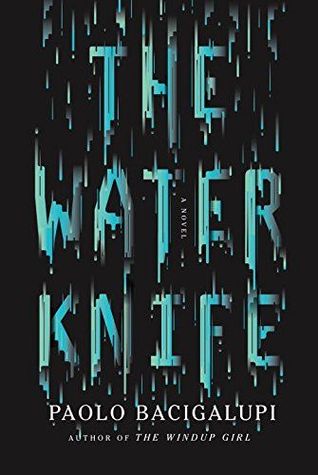In the near future, a drought-ridden American southwest fights over the dwindling water of the Colorado River, primarily controlled by an unscrupulous Californian capitalist who ensures the rich get all the water they want and the poor suffer in sand. Angel Velasquez, one of California’s assassin spies, a “water knife”, is sent to Phoenix to investigate rumors of a new water source. Also in Phoenix is Lucy Monroe, a northern journalist with a big conscience, and Maria Villarosa, a teenage refugee from Texas who tries to making a living without selling her body.
With Texas completely dried up and refugees overwhelming the southwest states, a Texas license plate can get you killed. Most dream of accumulating enough cash to be able to pay the “coyotes” to smuggle them across the Arizona-California border, but the daily reality is slums, violence, extortion, and prostitution. The severe ecological disparity as a result of privatization and deregulation comes across painfully well through detailed world building, but the focus is on the gray morality of staying alive in this apocalyptic dystopia.
While I enjoy the violence and mayhem of the action, the cruelty eventually becomes overwhelming, so that the high shock-value scenes are not as effective. The long swaths of character and scenery exposition through dialogue are more pronounced in the first half of the book, but even towards the end I do not quite connect with the characters. For me, the idea behind the book is more captivating than the novel itself.
Recommended as a gritty western thriller ecological dystopia that isn’t afraid of a sharp commentary of modern society!
“Pure data. You don’t believe data—you test data.” He grimaced. “If I could put my finger on the moment we genuinely fucked ourselves, it was the moment we decided that data was something you could use words like believe or disbelieve around.”
